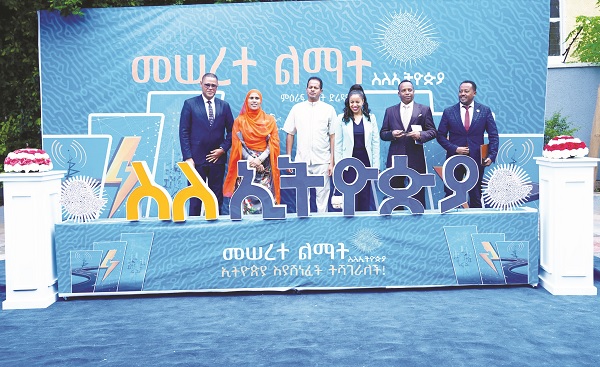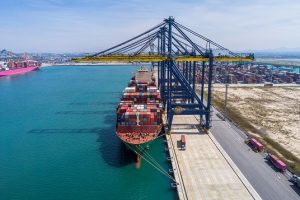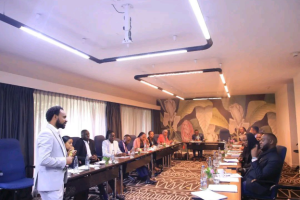
The Ethiopian Press Agency has staged a grand panel discussion in Dire Dawa town, on infrastructure development as part of its flagship nationwide ‘About Ethiopia’ program. This program has served as a nationwide public dialogue platform aimed at addressing the most pressing and current national matters. The event in Dire Dawa has marked the second edition and sixth round of the program, cultivating an open and inclusive dialogue on the country’s development priorities.
Dire Dawa’s session has attracted senior government officials, sector experts, scholars, and various dignitaries, with conversations centered on infrastructure, digital transformation, and sustainable energy.
The panel discussion has been moderated by Urban and Infrastructure Development Minister Chaltu Sani and has included panelists such as Frehiwot Tamiru, CEO of Ethio Telecom; Eng. Yonas Ayanaw, CEO of the Ethiopian Construction Works Corporation; and Dr. Eng. Sultan Weli, State Minister of Water and Energy. These panelists have explored the role of infrastructure in catalyzing national economic growth, with a particular focus on transport, logistics, digital strategies, and Ethiopia’s vast potential in renewable energy.
Throughout the session, the discussions have captured a strong sense of optimism about the Ethiopia’s future, especially concerning the country’s potential for digitalization and infrastructure expansion. Panelists have repeatedly stressed the need to modernize national systems and invest in advanced technologies that can expedite the development of infrastructure and digital services. They have recognized that while progress has been made, much more remains to be done to unlock Ethiopia’s full potential in these critical sectors.
At the forum, Ethio Telecom CEO Frehiwot Tamiru has offered valuable insights into the nation’s ongoing digital transformation. She has pointed out that digital financial services and payment gateways have experienced rapid growth, with user numbers having already reached 10 million. Frehiwot has stated that the increasing penetration of digital tools has become a vital driver of economic growth and must continue to expand. She has stressed the importance of connecting communities through strong digital infrastructure and highlighted how the integration of digital technologies into daily life has already begun reshaping the economy.
Frehiwot has further indicated the importance of modernizing all sectors of society to align with the goals of the Digital Ethiopia initiative. She has underlined that digital development should not be isolated to urban centers but must be inclusive, reaching rural and marginalized areas. In her view, digital inclusion is no longer optional—it has become essential for ensuring equal opportunities and promoting long-term national prosperity. She has also noted that the contribution of telecommunications to Ethiopia’s GDP has been growing and is expected to continue on an upward trajectory, with wide-reaching implications for the country’s future economic landscape.
In addition to digital concerns, infrastructure development has formed a central part of the panel’s discussions. Eng. Yonas Ayanaw, CEO of the Ethiopian Construction Works Corporation, has provided an overview of how the country’s infrastructure landscape has evolved over time. While acknowledging the advances that have been made, he has identified persistent challenges—especially with the maintenance and expansion of transport networks. Eng. Yonas has stressed the need to focus on upgrading existing road systems and embracing modern construction innovations to improve efficiency and profitability in the transportation sector. He has called for increased public and private sector engagement to ensure that infrastructure development keeps pace with Ethiopia’s growing population and expanding economy.
Eng. Yonas has remarked that infrastructure plays a critical role in reducing transportation costs and improving the movement of goods and services. He has noted that poorly maintained or underdeveloped roads limit economic opportunities, particularly for rural communities that rely on reliable transport for accessing markets. To address these limitations, he has urged the government and development partners to prioritize long-term planning and adopt forward-looking strategies that anticipate the future needs of the country.
Equally vital to the discussion has been the topic of sustainable energy. Dr. Eng. Sultan Weli, State Minister of Water and Energy, has highlighted the strong link between energy consumption and economic growth. He has noted that while Ethiopia possesses abundant energy resources, the country has done little to diversify its energy sources. Ethiopia, he said, has primarily relied on hydropower, but the need to incorporate other forms of renewable energy, such as solar, wind, and geothermal, has become increasingly apparent. Dr. Eng. Sultan has reiterated that Africa as a continent has lagged behind in developing clean energy sources, and Ethiopia must act decisively to address this shortfall.
He has clarified that the main challenge facing the country is not a shortage in power generation but rather inefficiencies in the power distribution and transmission networks. Dr. Eng. Sultan has pointed out that the country has struggled to provide consistent and reliable power to all areas, largely due to outdated infrastructure. Upgrading these systems has become essential to ensuring broader access to electricity and supporting both residential and industrial growth. He has emphasized that investment in multipurpose dams and modern energy grids will be central to Ethiopia’s energy strategy moving forward.
In one of the forum’s most noteworthy announcements, Urban and Infrastructure Development Minister Chaltu Sani has articulated an ambitious national vision: ensuring that no Ethiopian takes more than a single day to travel from one end of the country to the other using modern transportation. Chaltu has stated that feasibility studies have already been conducted and preparatory work has been underway to support the expansion of expressways needed to make this goal a reality.
She has emphasized that improved transportation infrastructure is critical to unlocking economic potential. A lack of proper roads, she has argued, continues to slow the pace of economic transition and development, particularly in regions where access remains limited. Despite the significant progress that has already been made in building road infrastructure, she has acknowledged the existence of several ongoing challenges. In particular, she has noted that in certain areas, construction efforts have faced delays due to demands from communities that do not align with the technical or safety standards required by road projects.
Chaltu has called on the public to play a cooperative role in the successful implementation of infrastructure plans. She has underscored the importance of community understanding and support in facilitating construction timelines and minimizing conflict. In her appeal, she has also urged investors—both domestic and international—to actively participate in the development of new road projects. According to her, investment in infrastructure is not just a public responsibility but a national imperative that can yield dividends for the broader economy.
Throughout the panel discussion the shared sentiment among participants has been that while progress has been made across multiple sectors, there has been widespread agreement that a great deal of work still remains to be done. The panelists have advocated for greater intersectoral collaboration, improved public-private partnerships, and enhanced institutional coordination to sustain development momentum.
‘About Ethiopia’ program has continued to be an essential platform for open, inclusive national dialogue. It has brought together perspectives from across the country and fostered informed conversations on infrastructure, digital transformation, and energy development. Through discussions like this, the Ethiopian Press Agency has promoted a constructive national narrative and encouraged collaborative problem-solving across government and society.
The event in Dire Dawa has not only spotlighted key development goals but has also reaffirmed the role of infrastructure in shaping Ethiopia’s long-term future. Whether through digital connectivity, modern transport networks, or expanded energy grids, the path forward has required innovation, investment, and unity.
BY DESTA GEBREHIWOT
THE ETHIOPIAN HERALD THURSDAY 19 JUNE 2025



